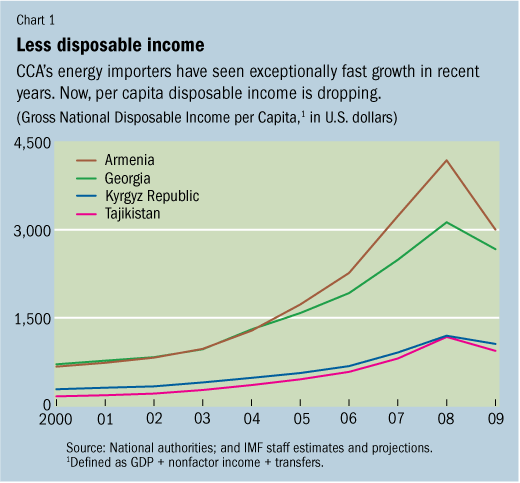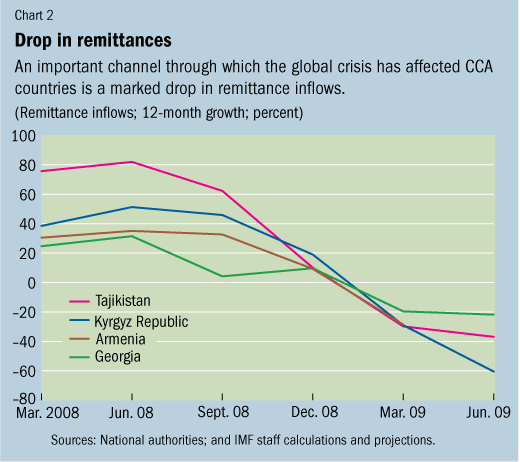Ahmed told a press conference in Istanbul that CCA policymakers have responded to the downturn by easing fiscal and monetary policies and strengthening social safety nets. The international community has also provided assistance to the region. For some countries, however, additional donor support will be needed to contain the adverse impact of the crisis, he said.
“The region as a whole should see a modest recovery in 2010, although the energy importing low-income countries in the region still face a difficult year ahead,” said Ahmed, speaking ahead of the IMF-World Bank Annual Meetings.
Solid growth for energy exporters

CCA countries differ substantially in terms of per capita GDP, which ranges from US$795 in Tajikistan to US$8,500 in Kazakhstan. Half of the region’s countries are exporters of gas and oil (Azerbaijan, Kazakhstan, Turkmenistan, and Uzbekistan), while the others are importers (Armenia, Georgia, the Kyrgyz Republic, and Tajikistan). This key difference largely accounts for the disparity in the outlook across countries.
Most CCA energy exporters have weathered the global downturn reasonably well and are projected to record solid growth in 2009, owing to long-term energy export contracts, supportive policies, and in some cases limited linkages to international markets. One exception is Kazakhstan, which is in the midst of a banking crisis as well as being hit by lower oil prices, and is likely to see GDP contract by about 2% in 2009, with recovery in 2010 held back by lingering problems in the banking system.
In contrast, Azerbaijan, Turkmenistan, and Uzbekistan are projected to register robust growth in 2009, supported mainly by public spending made possible by ample public savings accumulated during the boom years. With global energy demand increasing again, these countries are expected to grow strongly in 2010, according to IMF projections.
Energy importers face worsening living standards

The region’s four energy importers, on the other hand, are facing a marked slowdown in growth and deteriorating living standards mainly as a result of a sharp drop in remittances (Charts 1 and 2) from Russia, which is also in recession and has had to shed jobs previously filled by CCA workers.
These countries are being hit to varying degrees. Armenia, which experienced a strong construction boom and exceptionally fast growth in recent years, is likely to suffer a contraction of more than 15% in 2009. Georgia has also been seriously hit by the slowdown in foreign direct investment that had fueled its growth in recent years. In contrast, the Kyrgyz Republic and Tajikistan are faring better, helped by bumper harvests.
Donors, including neighboring Russia and China and the World Bank, have stepped in to help CCA’s energy importers weather the crisis. The IMF is providing assistance through the concessional Poverty Reduction and Growth Facility (in the case of Tajikistan) and under the IMF’s Exogenous Shocks Facility (the Kyrgyz Republic). Armenia and Georgia both have IMF Stand-By Arrangements.
“Official support is critical in helping the countries implement counter cyclical fiscal policies to tide them over the crisis,” Ahmed stressed, noting that this support should help bring about a gradual recovery for CCA’s energy importers in 2010.
Policy response

Governments and central banks in the region have responded to the impact of the global crisis with a wide range of instruments. Where possible, CCA countries should continue to pursue fiscal policies that support growth and keep social protection a priority, the IMF says. The energy importers will need additional donor support on concessional terms to prevent a buildup of unsustainable debt levels, while the energy exporters should use part of their anticipated uptake in revenue from rising energy prices to push ahead their structural reforms agenda.
Because financial sectors across the region are under stress, notably in Kazakhstan, restoring financial health remains a priority. The region’s vulnerabilities in this sector call for close monitoring of CCA financial systems as well as enhanced supervision and crisis preparedness.
The IMF also recommends that countries in the region continue to preserve exchange rate flexibility or move towards flexible exchange rate regimes over time to maintain competitiveness and discourage speculative capital flows.